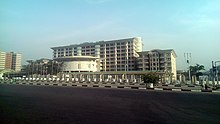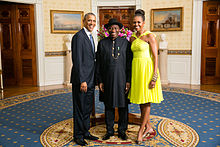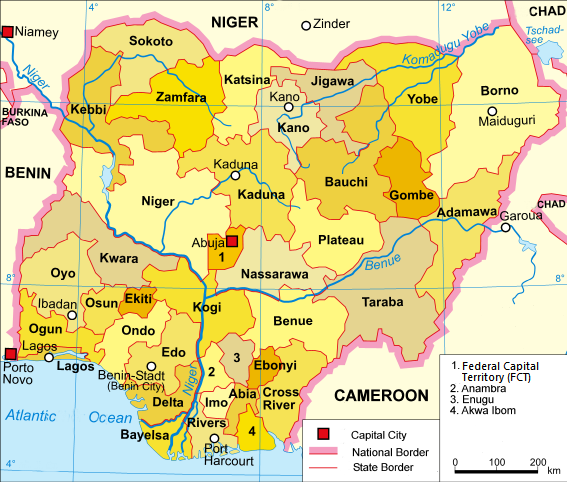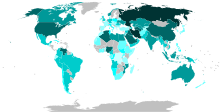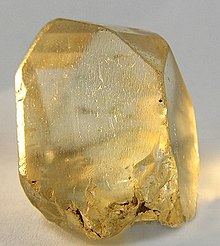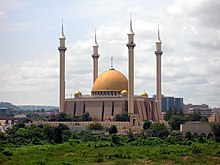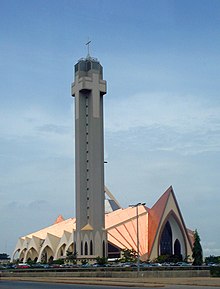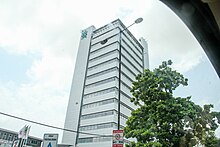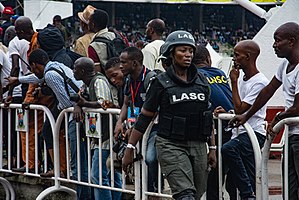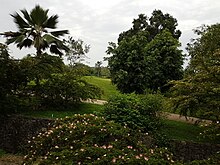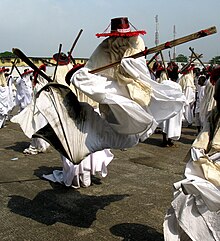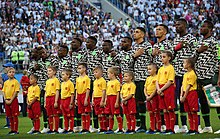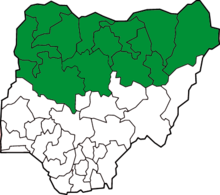Nigeria is a country located in West Africa. The official name of the country is the Federal Republic of Nigeria. The country has a population of 188,462,640 people, making it the 7th most populous country in the world. In terms of area, it is the 32nd largest country at 356,669 square miles. The country is a federal presidential republic with a president and vice president. The capital city is Abuja. However, the largest city is Lagos. The official currency is the Naira. Nigeria’s flag features three vertical stripes: two green stripes on each end and one white stripe in the middle.
Nigeria is a federal republic modelled after the United States,[78] with executive power exercised by the President. It is influenced by the Westminster System model[citation needed] in the composition and management of the upper and lower houses of the bicameral legislature. The president presides as both head of state and head of the federal government; the leader is elected by popular vote to a maximum of two 4-year terms.[79] In 28 March 2015 presidential election, General Muhammadu Buhari emerged victorious to become the President of the Federal Republic of Nigeria, defeating then-incumbent Dr Goodluck Jonathan. Despite the economic slow down in the country Muhammadu Buhari was re-elected in February 2019 for a second term.
The president’s power is checked by a Senate and a House of Representatives, which are combined in a bicameral body called the National Assembly. The Senate is a 109-seat body with three members from each state and one from the capital region of Abuja; members are elected by popular vote to four-year terms. The House contains 360 seats, with the number of seats per state determined by population.[79]
Ethnocentrism, tribalism, religious persecution, and prebendalism have affected Nigerian politics both prior and subsequent to independence in 1960. Kin-selective altruism has made its way into Nigerian politics, resulting in tribalist efforts to concentrate Federal power to a particular region of their interests.[80] Nationalism has also led to active secessionist movements such as MASSOB, Nationalist movements such as Oodua Peoples Congress, Movement for the Emancipation of the Niger Delta and a civil war. Nigeria’s three largest ethnic groups (Hausa, Igbo and Yoruba) have maintained historical preeminence in Nigerian politics; competition amongst these three groups has fuelled corruption and graft.[81]
Because of the above issues, Nigeria’s political parties are pan-national and secular in character (though this does not preclude the continuing preeminence of the dominant ethnicities).[81][82] The two major political parties are the People’s Democratic Party of Nigeria and the All Progressives Congress. About twenty minor opposition parties are registered.
The then-president, Olusegun Obasanjo, acknowledged fraud and other electoral “lapses” but said the result reflected opinion polls. In a national television address in 2007, he added that if Nigerians did not like the victory of his handpicked successor, they would have an opportunity to vote again in four years.[83]
In the Nigerian general election, 2015, the victorious All Progressives Congress has 225 House seats and 60 in the Senate while the defeated People’s Democratic Party of Nigeria became the opposition with 125 seats in the House and 49 in the Senate.
| Flag | Bicolour |
| Emblem | Coat of arms of Nigeria |
| Anthem | “Arise, O Compatriots“ |
| Animal | Eagle |
| Bird | Black crowned crane |
| Flower | Costus spectabilis |
As in many other African societies, prebendalism and high rates of corruption continue to constitute major challenges to Nigeria. All major parties have practised vote-rigging and other means of coercion to remain competitive. In the period before 1983 election, a report of experts prepared by the National Institute of Policy and Strategic Studies showed that only the 1959 and 1979 elections were held without systematic rigging.[84] In 2012, Nigeria was estimated to have lost over $400 billion to corruption since independence.[85]
Law
There are three distinct systems of law in Nigeria:
- Common law, derived from its British colonial past, and a development of its own after independence;
- Customary law, derived from indigenous traditional norms and practice, including the dispute resolution meetings of pre-colonial Yorubaland secret societies and the Ẹ̀kpẹ̀ and Ọ̀kọ́ńkọ̀ of Igboland and Ibibioland;
- Sharia law, used only in the predominantly Muslim northern states of the country. It is an Islamic legal system that had been used long before the colonial administration. In late 1999, Zamfara emphasised its use, with eleven other northern states following suit. These states are Kano, Katsina, Niger, Bauchi, Borno, Kaduna, Gombe, Sokoto, Jigawa, Yobe, and Kebbi.[86]
The country has a judicial branch, the highest court of which is the Supreme Court of Nigeria.[79]
Foreign relations
The Ministry of Foreign Affairs, Abuja
Upon gaining independence in 1960, Nigeria made African unity the centrepiece of its foreign policy and played a leading role in the fight against the apartheid government in South Africa.[87] One exception to the African focus was Nigeria’s close relationship developed with Israel throughout the 1960s. The latter nation sponsored and oversaw the construction of Nigeria’s parliament buildings.[88]
Nigeria’s foreign policy was tested in the 1970s after the country emerged united from its own civil war. It supported movements against white minority governments in the Southern Africa sub-region. Nigeria backed the African National Congress (ANC) by taking a committed tough line with regard to the South African government and their military actions in southern Africa. Nigeria was also a founding member of the Organisation for African Unity (now the African Union), and has tremendous influence in West Africa and Africa on the whole. Nigeria has additionally founded regional cooperative efforts in West Africa, functioning as standard-bearer for the Economic Community of West African States (ECOWAS) and ECOMOG, economic and military organizations, respectively.
With this Africa-centred stance, Nigeria readily sent troops to the Congo at the behest of the United Nations shortly after independence (and has maintained membership since that time). Nigeria also supported several Pan-African and pro-self government causes in the 1970s, including garnering support for Angola‘s MPLA, SWAPO in Namibia, and aiding opposition to the minority governments of Portuguese Mozambique, and Rhodesia.
Former Nigerian President Goodluck Jonathan (center) poses with United States President Barack Obama and First Lady Michelle Obama in August 2014
Nigeria retains membership in the Non-Aligned Movement. In late November 2006, it organised an Africa-South America Summit in Abuja to promote what some attendees termed “South-South” linkages on a variety of fronts.[89] Nigeria is also a member of the International Criminal Court, and the Commonwealth of Nations. It was temporarily expelled from the latter in 1995 when ruled by the Abacha regime.
Nigeria has remained a key player in the international oil industry since the 1970s, and maintains membership in Organization of the Petroleum Exporting Countries (OPEC), which it joined in July 1971. Its status as a major petroleum producer figures prominently in its sometimes volatile international relations with both developed countries, notably the United States, and the developing countries of China, Jamaica, and Ghana and Kenya in Africa.[90]
Millions of Nigerians have emigrated during times of economic hardship, primarily to Europe, North America and Australia. It is estimated that over a million Nigerians have emigrated to the United States and constitute the Nigerian American populace. Individuals in many such Diasporic communities have joined the “Egbe Omo Yoruba” society, a national association of Yoruba descendants in North America.[91]
In July 2019, UN ambassadors of 37 countries, including Nigeria, have signed a joint letter to the UNHRC defending China‘s treatment of Uyghurs in the Xinjiang region.[92]
Military
Nigerian Army self-propelled anti-aircraft gun
Nigerian Air Force Mil Mi-35P
The Nigerian military are charged with protecting the Federal Republic of Nigeria, promoting Nigeria’s global security interests, and supporting peacekeeping efforts, especially in West Africa. This is in support of the doctrine sometimes called Pax Nigeriana.
The Nigerian Military consist of an army, a navy, and an air force.[79] The military in Nigeria have played a major role in the country’s history since independence. Various juntas have seized control of the country and ruled it through most of its history. Its last period of military rule ended in 1999 following the sudden death of former dictator Sani Abacha in 1998. His successor, Abdulsalam Abubakar, handed over power to the democratically-elected government of Olusegun Obasanjo the next year.
As Africa’s most populated country, Nigeria has repositioned its military as a peacekeeping force on the continent. Since 1995, the Nigerian military, through ECOMOG mandates, have been deployed as peacekeepers in Liberia (1997), Ivory Coast (1997–1999), and Sierra Leone (1997–1999).[93] Under an African Union mandate, it has stationed forces in Sudan‘s Darfur region to try to establish peace.
In 2017, Nigeria signed the UN treaty on the Prohibition of Nuclear Weapons.[94]
Nigeria is located in western Africa on the Gulf of Guinea and has a total area of 923,768 km2 (356,669 sq mi),[95] making it the world’s 32nd-largest country (after Tanzania). It is comparable in size to Venezuela, and is about twice the size of the US state of California. Its borders span for 4,047-kilometre (2,515 mi)s, and it shares borders with Benin (773 km or 480 mi), Niger (1,497 km or 930 mi), Chad (87 km or 54 mi), Cameroon (1,690 km or 1,050 mi), and has a coastline of at least 853 kilometres (530 miles)s.[96] Nigeria lies between latitudes 4° and 14°N, and longitudes 2° and 15°E.
The Zuma Rock near Suleja
The highest point in Nigeria is Chappal Waddi at 2,419 m (7,936 ft). The main rivers are the Niger and the Benue, which converge and empty into the Niger Delta. This is one of the world’s largest river deltas, and the location of a large area of Central African mangroves.
Nigeria has a varied landscape. The far south is defined by its tropical rainforest climate, where annual rainfall is 60 to 80 inches (1,500 to 2,000 mm) a year.[97] In the southeast stands the Obudu Plateau. Coastal plains are found in both the southwest and the southeast.[98] This forest zone‘s most southerly portion is defined as “salt water swamp”, also known as a mangrove swamp because of the large amount of mangroves in the area. North of this is fresh water swamp, containing different vegetation from the salt water swamp, and north of that is rainforest.[99]
Nigeria’s most expansive topographical region is that of the valleys of the Niger and Benue river valleys (which merge into each other and form a “y” shape).[98] To the southwest of the Niger is “rugged” highland. To the southeast of the Benue are hills and mountains, which form the Mambilla Plateau, the highest plateau in Nigeria. This plateau extends through the border with Cameroon, where the montane land is part of the Bamenda Highlands of Cameroon.
The area near the border with Cameroon close to the coast is rich rainforest and part of the Cross-Sanaga-Bioko coastal forests ecoregion, an important centre for biodiversity. It is habitat for the drill monkey, which is found in the wild only in this area and across the border in Cameroon. The areas surrounding Calabar, Cross River State, also in this forest, are believed to contain the world’s largest diversity of butterflies. The area of southern Nigeria between the Niger and the Cross Rivers has lost most of its forest because of development and harvesting by increased population, with it being replaced by grassland (see Cross-Niger transition forests).
Everything in between the far south and the far north is savannah (insignificant tree cover, with grasses and flowers located between trees). Rainfall is more limited, to between 500 and 1,500 millimetres (20 and 60 in) per year.[97] The savannah zone’s three categories are Guinean forest-savanna mosaic, Sudan savannah, and Sahel savannah. Guinean forest-savanna mosaic is plains of tall grass interrupted by trees. Sudan savannah is similar but with shorter grasses and shorter trees. Sahel savannah consists of patches of grass and sand, found in the northeast.[99] In the Sahel region, rain is less than 500 millimetres (20 in) per year and the Sahara Desert is encroaching.[97] In the dry northeast corner of the country lies Lake Chad, which Nigeria shares with Niger, Chad and Cameroon.
Environmental issues
Rainforest range of Obudu Mountains
Nigeria’s Delta region, home of the large oil industry, experiences serious oil spills and other environmental problems, which has caused conflict.
Waste management including sewage treatment, the linked processes of deforestation and soil degradation, and climate change or global warming are the major environmental problems in Nigeria. Waste management presents problems in a mega city like Lagos and other major Nigerian cities which are linked with economic development, population growth and the inability of municipal councils to manage the resulting rise in industrial and domestic waste. This huge waste management problem is also attributable to unsustainable environmental management lifestyles of Kubwa Community in the Federal Capital Territory, where there are habits of indiscriminate disposal of waste, dumping of waste along or into the canals, sewerage systems that are channels for water flows, and the like.
Haphazard industrial planning, increased urbanisation, poverty and lack of competence of the municipal government are seen as the major reasons for high levels of waste pollution in major cities of the country. Some of the ‘solutions’ have been disastrous to the environment, resulting in untreated waste being dumped in places where it can pollute waterways and groundwater.[100]
In 2005 Nigeria had the highest rate of deforestation in the world, according to the Food and Agriculture Organization of the United Nations (FAO).[101] That year, 12.2%, the equivalent of 11,089,000 hectares had been forested in the country. Between 1990 and 2000, Nigeria lost an average of 409,700 hectares of forest every year equal to an average annual deforestation rate of 2.4%. Between 1990 and 2005, in total Nigeria lost 35.7% of its forest cover, or around 6,145,000 hectares.[102]
In 2010, thousands of people were inadvertently exposed to lead-containing soil / ore from informal gold mining within the northern state of Zamfara. While estimates vary, it is thought that upwards of 400 children died of acute lead poisoning, making this perhaps the largest lead poisoning fatality epidemic ever encountered.[103] As of 2016, efforts to manage the exposure are ongoing.
Administrative divisions
| Major cities | |
| City | Population |
|---|---|
| Lagos | 8,048,430 |
| Kano | 3,931,300 |
| Ibadan | 2,559,853 |
| Benin City | 1,147,188 |
| Port Harcourt | 1,005,904 |
Nigeria is divided into thirty-six states and one Federal Capital Territory, which are further sub-divided into 774 Local Government Areas (LGAs). In some contexts, the states are aggregated into six geopolitical zones: North West, North East, North Central, South East, South South, and South West.[104][105]
As of the 2006 census, Nigeria has eight cities with a population of over 1 million people (from largest to smallest): Lagos, Kano, Ibadan, Benin City and Port Harcourt. Lagos is the largest city in Africa, with a population of over 12 million in its urban area.[106]
|
||||||||||||
Economy
Maitama district, Abuja
Nigeria is classified as a mixed economy emerging market. It has reached lower middle income status according to the World Bank,[107] with its abundant supply of natural resources, well-developed financial, legal, communications, transport sectors and stock exchange (the Nigerian Stock Exchange), which is the second largest in Africa.
Nigeria was ranked 21st in the world in terms of GDP (PPP) in 2015.[108] Nigeria is the United States’ largest trading partner in sub-Saharan Africa and supplies a fifth of its oil (11% of oil imports). It has the seventh-largest trade surplus with the US of any country worldwide. Nigeria is the 50th-largest export market for US goods and the 14th-largest exporter of goods to the US. The United States is the country’s largest foreign investor.[109] The International Monetary Fund (IMF) projected economic growth of 9% in 2008 and 8.3% in 2009.[110][111][112] The IMF further projects an 8% growth in the Nigerian economy in 2011.[113]
In February 2011, Citigroup projected that Nigeria would have the highest average GDP growth in the world in 2010–2050. Nigeria is one of two countries from Africa among 11 Global Growth Generators countries.[114]
Previously, economic development had been hindered by years of military rule, corruption, and mismanagement. The restoration of democracy and subsequent economic reforms have successfully put Nigeria back on track towards achieving its full economic potential. As of 2014 it is the largest economy in Africa, having overtaken South Africa.
During the oil boom of the 1970s, Nigeria accumulated a significant foreign debt to finance major infrastructural investments. With the fall of oil prices during the 1980s oil glut Nigeria struggled to keep up with its loan payments and eventually defaulted on its principal debt repayments, limiting repayment to the interest portion of the loans. Arrears and penalty interest accumulated on the unpaid principal, which increased the size of the debt. After negotiations by the Nigerian authorities, in October 2005 Nigeria and its Paris Club creditors reached an agreement under which Nigeria repurchased its debt at a discount of approximately 60%. Nigeria used part of its oil profits to pay the residual 40%, freeing up at least $1.15 billion annually for poverty reduction programmes. Nigeria made history in April 2006 by becoming the first African country to completely pay off its debt (estimated $30 billion) owed to the Paris Club.
Nigeria is trying to reach the first of the Sustainable Development Goals, which is to end poverty in all its forms by 2030.
Agriculture
Farm ploughing in Kwara State
As of 2010, about 30% of Nigerians are employed in agriculture.[115] Agriculture used to be the principal foreign exchange earner of Nigeria.[116]
Major crops include beans, sesame, cashew nuts, cassava, cocoa beans, groundnuts, gum arabic, kolanut, maize (corn), melon, millet, palm kernels, palm oil, plantains, rice, rubber, sorghum, soybeans and yams.[117] Cocoa is the leading non-oil foreign exchange earner.[117] Rubber is the second-largest non-oil foreign exchange earner.[117]
Prior to the Nigerian civil war, Nigeria was self-sufficient in food.[117] Agriculture has failed to keep pace with Nigeria’s rapid population growth, and Nigeria now relies upon food imports to sustain itself.[117] The Nigerian government promoted the use of inorganic fertilizers in the 1970s.[118] In August 2019, Nigeria closed its border with Benin to stop rice smuggling into the country as part of efforts to boost the local production.[119]
Oil and natural gas
Oando head office in Victoria Island, Lagos
Nigeria is the 12th largest producer of petroleum in the world and the 8th largest exporter, and has the 10th largest proven reserves. (The country joined OPEC in 1971.) Petroleum plays a large role in the Nigerian economy, accounting for 40% of GDP and 80% of Government earnings. However, agitation for better resource control in the Niger Delta, its main oil-producing region, has led to disruptions in oil production and prevents the country from exporting at 100% capacity.[120]
Headquarters of the Nigerian National Petroleum Corporation (NNPC)
Countries by natural gas proven reserves (2014). Nigeria has the largest reserves in Africa.
The Niger Delta Nembe Creek Oil field was discovered in 1973 and produces from middle Miocene deltaic sandstone–shale in an anticline structural trap at a depth of 2 to 4 kilometres (1.2 to 2.5 miles).[121] In June 2013, Shell announced a strategic review of its operations in Nigeria, hinting that assets could be divested. While many international oil companies have operated there for decades, by 2014 most were making moves to divest their interests, citing a range of issues including oil theft. In August 2014, Shell Oil Company said it was finalising its interests in four Nigerian oil fields.[122]
Nigeria has a total of 159 oil fields and 1,481 wells in operation according to the Department of Petroleum Resources.[123] The most productive region of the nation is the coastal Niger Delta Basin in the Niger Delta or “South-south” region which encompasses 78 of the 159 oil fields. Most of Nigeria’s oil fields are small and scattered, and as of 1990, these small fields accounted for 62.1% of all Nigerian production. This contrasts with the sixteen largest fields which produced 37.9% of Nigeria’s petroleum at that time.[124]
Oil facility at Bonny Island, Rivers State
Overseas remittances
Next to petrodollars, the second biggest source of foreign exchange earnings for Nigeria are remittances sent home by Nigerians living abroad.[125][125]
According to the International Organization for Migration, Nigeria witnessed a dramatic increase in remittances sent home from overseas Nigerians, going from US$2.3 billion in 2004 to 17.9 billion in 2007. The United States accounts for the largest portion of official remittances, followed by the United Kingdom, Italy, Canada, Spain and France. On the African continent, Egypt, Equatorial Guinea, Chad, Libya and South Africa are important source countries of remittance flows to Nigeria, while China is the biggest remittance-sending country in Asia.
Services
Nigeria has one of the fastest growing telecommunications markets in the world, major emerging market operators (like MTN, 9mobile, Airtel and Globacom) basing their largest and most profitable centres in the country.[126] The government has recently begun expanding this infrastructure to space based communications. Nigeria has a space satellite that is monitored at the Nigerian National Space Research and Development Agency Headquarters in Abuja.
Nigeria has a highly developed financial services sector, with a mix of local and international banks, asset management companies, brokerage houses, insurance companies and brokers, private equity funds and investment banks.[127]
Nigeria Air
On 18 July 2018, the Nigeria government announced a new birth of a National Carrier, the Nigeria Air,[128] this is after 15 years during which the former carrier was shut down as a result of mismanagement. Nigeria Air is meant to be operated under government/private partnership and the government is expected to fund the initial capital of $300 million within the next 5 years.
The Name, Logo and the government planned was announced the same day it was launched, the Nigeria website and staff have not been planned. Though the issue of the staff is expected to be managed by the private owners. It is worthy to note that Nigeria Air is different from Air Nigeria, an airline company owned by NICON ground and Virgin Atlantic Airways
Mining
Topaz from the Jos Plateau in Plateau State
Nigeria also has a wide array of underexploited mineral resources which include natural gas, coal, bauxite, tantalite, gold, tin, iron ore, limestone, niobium, lead and zinc.[129] Despite huge deposits of these natural resources, the mining industry in Nigeria is still in its infancy.
Manufacturing and technology
Nigeria has a manufacturing industry that includes leather and textiles (centred on Kano, Abeokuta, Onitsha, and Lagos), Nigeria currently has an indigenous auto manufacturing company; Innoson Vehicle Manufacturing[citation needed] located in Nnewi. It produces Buses and SUVs.car manufacturing (for the French car manufacturer Peugeot as well as for the English truck manufacturer Bedford, now a subsidiary of General Motors), T-shirts, plastics and processed food.
Nigeria in recent years has been embracing industrialisation. It currently has an indigenous vehicle manufacturing company, Innoson Motors, which manufactures Rapid Transit Buses, trucks and SUVs with an upcoming introduction of cars.[130] Nigeria also has few Electronic manufacturers like Zinox, the first Branded Nigerian Computer and Electronic gadgets (like tablet PCs) manufacturers.[131] In 2013, Nigeria introduced a policy regarding import duty on vehicles to encourage local manufacturing companies in the country.[132][133] In this regard, some foreign vehicle manufacturing companies like Nissan have made known their plans to have manufacturing plants in Nigeria.[134] Ogun is considered to be the current Nigeria’s industrial hub, as most factories are located in Ogun and more companies are moving there, followed by Lagos.[135][136][137] The city of Aba in south-eastern part of the country are well known for their handicrafts, famously known as “Aba made”.
Demographics
| Population in Nigeria[142][143] | |||
|---|---|---|---|
| Year | Million | ||
| 1971 | 55 | ||
| 1980 | 71 | ||
| 1990 | 95 | ||
| 2000 | 125 | ||
| 2004 | 138 | ||
| 2008 | 151 | ||
| 2012 | 167 | ||
| 2016 | 186 | ||
| 2017 | 191 | ||
Nigeria’s population increased by 57 million from 1990 to 2008, a 60% growth rate in less than two decades.[142] As of 2017, the population stood at 191 million. Around 42.5% of the population were 14 years or younger, 19.6% were aged 15–24, 30.7% were aged 25–54, 4.0% aged 55–64, and 3.1% aged 65 years or older. The median age in 2017 was 18.4 years.[144] Nigeria is the most populous country in Africa and accounts for about 17% of the continent’s total population as of 2017; however, exactly how populous is a subject of speculation.[143]
The United Nations estimates that the population in 2016 was at 185,989,640[145], distributed as 51.7% rural and 48.3% urban, and with a population density of 167.5 people per square kilometre. National census results in the past few decades have been disputed. The results of the most recent census were released in December 2006 and gave a population of 140,003,542. The only breakdown available was by gender: males numbered 71,709,859, females numbered 68,293,008. In June 2012, President Goodluck Jonathan said that Nigerians should limit their number of children.[146]
According to the United Nations, Nigeria has been undergoing explosive population growth and has one of the highest growth and fertility rates in the world. By their projections, Nigeria is one of eight countries expected to account collectively for half of the world’s total population increase in 2005–2050.[147] By 2100 the UN estimates that the Nigerian population will be between 505 million and 1.03 billion people (middle estimate: 730 million).[148] In 1950, Nigeria had only 33 million people.[149]
One in six Africans is Nigerian as of 2019.[150] Presently, Nigeria is the seventh most populous country in the world. The birth rate is 35.2-births/1000 population and the death rate is 9.6 deaths/1000 population as of 2017, while the total fertility rate is 5.07 children born/woman.[151]
Nigeria’s largest city is Lagos. Lagos has grown from about 300,000 in 1950[152] to an estimated 13.4 million in 2017.[153]
| Largest Cities in Nigeria, 2017[153] | |||
|---|---|---|---|
| City | Million | ||
| Lagos | 13.463 | ||
| Kano | 3.82 | ||
| Ibadan | 3.383 | ||
| Abuja | 2.919 | ||
| Port Harcourt | 2.343 | ||
| Benin City | 1.628 | ||
Ethnic groups
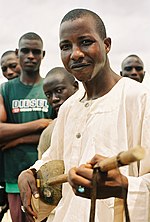 |
 |
 |
| A Hausa lute player | Igbo Chief | Yoruba drummers |
Nigeria has more than 250 ethnic groups, with varying languages and customs, creating a country of rich ethnic diversity. The three largest ethnic groups are the Hausa, Yoruba and Igbo, together accounting for more than 70% of the population, while the Edo, Ijaw, Fulɓe, Kanuri, Urhobo-Isoko, Ibibio, Ebira, Nupe, Gbagyi, Jukun, Igala, Idoma and Tiv comprise between 25 and 30%; other minorities make up the remaining 5%.[154]
The middle belt of Nigeria is known for its diversity of ethnic groups, including the Pyem, Goemai, and Kofyar. The official population count of each of Nigeria’s ethnicities has always remained controversial and disputed as members of different ethnic groups believe the census is rigged to give a particular group (usually believed to be northern groups) numerical superiority.[106][155][156]
There are small minorities of British, American, East Indian, Chinese (est. 50,000),[157] white Zimbabwean,[158] Japanese, Greek, Syrian and Lebanese immigrants in Nigeria. Immigrants also include those from other West African or East African nations. These minorities mostly reside in major cities such as Lagos and Abuja, or in the Niger Delta as employees for the major oil companies. A number of Cubans settled in Nigeria as political refugees following the Cuban Revolution.
In the middle of the 19th century, a number of ex-slaves of Afro-Cuban and Afro-Brazilian descent[159] and emigrants from Sierra Leone established communities in Lagos and other regions of Nigeria. Many ex-slaves came to Nigeria following the emancipation of slaves in the Americas. Many of the immigrants, sometimes called Saro (immigrants from Sierra Leone) and Amaro (ex-slaves from Brazil)[160] later became prominent merchants and missionaries in these cities.
Languages
In some areas of Nigeria, ethnic groups speak more than one language. The official language of Nigeria, English, was chosen to facilitate the cultural and linguistic unity of the country, owing to the influence of British colonisation that ended in 1960.
Many French speakers from surrounding countries have influenced the English spoken in the border regions of Nigeria and some Nigerian citizens have become fluent enough in French to work in the surrounding countries. The French spoken in Nigeria may be mixed with some native languages but is mostly spoken like the French spoken in Benin. French may also be mixed with English as it is in Cameroon.
The major languages spoken in Nigeria represent three major families of languages of Africa: the majority are Niger-Congo languages, such as Igbo, Yoruba, Ijaw, Fulfulde, and Edo. Kanuri, spoken in the northeast, primarily in Borno and Yobe State, is part of the Nilo-Saharan family, and Hausa is an Afroasiatic language.
Even though most ethnic groups prefer to communicate in their own languages, English as the official language is widely used for education, business transactions and for official purposes. English as a first language is used only by a small minority of the country’s urban elite, and it is not spoken at all in some rural areas. Hausa is the most widely spoken of the three main languages spoken in Nigeria itself.
With the majority of Nigeria’s populace in the rural areas, the major languages of communication in the country remain indigenous languages. Some of the largest of these, notably Yoruba and Igbo, have derived standardised languages from a number of different dialects and are widely spoken by those ethnic groups. Nigerian Pidgin English, often known simply as “Pidgin” or “Broken” (Broken English), is also a popular lingua franca, though with varying regional influences on dialect and slang. The pidgin English or Nigerian English is widely spoken within the Niger Delta Regions, predominantly in Warri, Sapele, Port Harcourt, Agenebode, Ewu, and Benin City.[161]
Religion
Nigeria is a religiously diverse society, with Christianity and Islam being the most widely professed religions. Nigerians are nearly equally divided into Christians and Muslims, with a tiny minority of adherents of Traditional African religions and other religions.[162] As common in other parts of Africa where Christianity and Islam are dominant, religious syncretism with the Traditional African religions is common throughout Nigeria.[163]
Islam dominates North Western (Hausa, Fulani and others) and a good portion of Northern Eastern (Kanuri, Fulani and other groups) Nigeria. It also has a number of adherents in the South Western, Yoruba part of the country. Nigeria has the largest Muslim population in sub-Saharan Africa. Protestant and locally cultivated Christianity are also widely practiced in Western areas, while Roman Catholicism is a more prominent Christian feature of South Eastern Nigeria. Both Roman Catholicism and Protestantism are observed in the Ibibio, Annang, Efik and Ijo lands of the south.
The 1963 census indicated that 47% of Nigerians were Muslim, 35% Christian, and 18% members of local indigenous religions. If accurate, this indicated a sharp increase since 1953 in the number of Christians (up 23%); a decline among those professing indigenous beliefs, compared with 20%; and only a modest (6%) drop of Muslims which can likely be attributed to immigration, emigration, and birthrate.
The vast majority of Muslims in Nigeria are Sunni belonging to Maliki school of jurisprudence; however, a sizeable minority also belongs to Shafi madhhab. A large number of Sunni Muslims are members of Sufi brotherhoods. Most Sufis follow the Qadiriyya, Tijaniyyah and/or the Mouride movements. A significant Shia minority exists (see Shia in Nigeria). Some northern states have incorporated Sharia law into their previously secular legal systems, which has brought about some controversy.[164] Kano State has sought to incorporate Sharia law into its constitution.[165] The majority of Quranists follow the Kalo Kato or Quraniyyun movement. There are also Ahmadiyya and Mahdiyya minorities,[166] as well as Bahá’ís.[167]
According to a 2001 report[168] from The World Factbook by CIA, about 47% of Nigeria’s population is Muslim, 43% are Christians and 10% adhere to local religions.[169] But in some recent report, the Christian population is now sightly larger than the Muslim population. An 18 December 2012 report on religion and public life by the Pew Research Center stated that in 2010, 49.3 percent of Nigeria’s population was Christian, 48.8 percent was Muslim, and 1.9 percent were followers of indigenous and other religions, or unaffiliated.[170]
The 2010 census of Association of Religion Data Archives has also reported that 46.5% of the total population was Christian, slightly larger than the Muslim population of 45.5%, while 7.7% were members of other religions.[171] However, these estimates should be taken with caution because sample data is mostly collected from major urban areas in the south, which are predominantly Christian.[172][173][174]
Among Christians, the Pew Research survey found that 74% were Protestant, 25% were Catholic, and 1% belonged to other Christian denominations, including a small Orthodox Christian community.[175] In terms of Nigeria’s major ethnic groups, the Hausa ethnic group (predominant in the north) was found to be 95% Muslim and 5% Christian, the Yoruba tribe (predominant in the west) was 55% Muslim, 35% Christian and 10% adherents of other religions, while the Igbos (predominant in the east) and the Ijaw (south) were 98% Christian, with 2% practising traditional religions.[176] The middle belt of Nigeria contains the largest number of minority ethnic groups in Nigeria, who were found to be mostly Christians and members of traditional religions, with a small proportion of Muslims.[177][178]
Leading Protestant churches in the country include the Church of Nigeria of the Anglican Communion, the Assemblies of God Church, the Nigerian Baptist Convention and The Synagogue, Church Of All Nations. Since the 1990s, there has been significant growth in many other churches, independently started in Africa by Africans, particularly the evangelical Protestant ones. These include the Redeemed Christian Church of God, Winners’ Chapel, Christ Apostolic Church (the first Aladura Movement in Nigeria), Living Faith Church Worldwide, Deeper Christian Life Ministry, Evangelical Church of West Africa, Mountain of Fire and Miracles, Christ Embassy, Lord’s Chosen Charismatic Revival Movement, Celestial Church of Christ, and Dominion City.[179] In addition, The Church of Jesus Christ of Latter-day Saints, the Aladura Church, the Seventh-day Adventist and various indigenous churches have also experienced growth.[180][181]
The Yoruba area contains a large Anglican population, while Igboland is predominantly Roman Catholic and the Edo area is composed predominantly of members of the Pentecostal Assemblies of God, which was introduced into Nigeria by Augustus Ehurie Wogu and his associates at Old Umuahia.
Further, Nigeria has become an African hub for the Grail Movement and the Hare Krishnas,[182] and the largest temple of the Eckankar religion is in Port Harcourt, Rivers State, with a total capacity of 10,000.
The Church of Jesus Christ of Latter-Day Saints (LDS) announced creation of new Owerri mission in Nigeria in 2016.[183]
Health
At a dental office in Lagos.
Successful emergency Caesarean section done in Nigeria.
Health care delivery in Nigeria is a concurrent responsibility of the three tiers of government in the country, and the private sector.[184] Nigeria has been reorganising its health system since the Bamako Initiative of 1987, which formally promoted community-based methods of increasing accessibility of drugs and health care services to the population, in part by implementing user fees.[185] The new strategy dramatically increased accessibility through community-based health care reform, resulting in more efficient and equitable provision of services. A comprehensive approach strategy was extended to all areas of health care, with subsequent improvement in the health care indicators and improvement in health care efficiency and cost.[186]
HIV/AIDS rate in Nigeria is much lower compared to the other African nations such as Kenya or South Africa whose prevalence (percentage) rates are in the double digits. As of 2012, the HIV prevalence rate among adults ages 15–49 was just 3.1 percent.[187][188] As of 2014, life expectancy in Nigeria is 52.62 years on average according to CIA,[189] and just over half the population have access to potable water and appropriate sanitation; As of 2010, the infant mortality is 8.4 deaths per 1000 live births.[190]
Nigeria was the only country in Africa to have never eradicated polio, which it periodically exported to other African countries;[191] Polio was cut 98% between 2009 and 2010. However, a major breakthrough came in December 2014, when it was reported that Nigeria hadn’t recorded a polio case in 6 months, and was on its way to being declared Polio free.[192][193] In 2012, a new bone marrow donor program was launched by the University of Nigeria to help people with leukaemia, lymphoma, or sickle cell disease to find a compatible donor for a life-saving bone marrow transplant, which cures them of their conditions. Nigeria became the second African country to have successfully carried out this surgery.[194] In the 2014 ebola outbreak, Nigeria was the first country to effectively contain and eliminate the Ebola threat that was ravaging three other countries in the West African region, the unique method of contact tracing employed by Nigeria became an effective method later used by countries such as the United States, when ebola threats were discovered.[195][196][197]
The Nigerian health care system is continuously faced with a shortage of doctors known as ‘brain drain‘, because of emigration by skilled Nigerian doctors to North America and Europe. In 1995, it was estimated that 21,000 Nigerian doctors were practising in the United States alone, which is about the same as the number of doctors working in the Nigerian public service. Retaining these expensively trained professionals has been identified as one of the goals of the government.[198]
Education
Education in Nigeria is overseen by the Ministry of Education. Local authorities take responsibility for implementing policy for state-controlled public education and state schools at a regional level. The education system is divided into Kindergarten, primary education, secondary education and tertiary education. After the 1970s oil boom, tertiary education was improved so that it would reach every subregion of Nigeria. 68% of the Nigerian population is literate, and the rate for men (75.7%) is higher than that for women (60.6%).[199]
Nigeria provides free, government-supported education, but attendance is not compulsory at any level, and certain groups, such as nomads and the handicapped, are under-served. The education system consists of six years of primary school, three years of junior secondary school, three years of senior secondary school, and four, five or six years of university education leading to a bachelor’s degree.[199]
Tertiary education
Open University of Nigeria, Lagos
The government has majority control of university education. Tertiary education in Nigeria consists of Universities (Public and Private), Polytechnics, Monotechnics, and Colleges of education. The country has a total number of 129 universities registered by NUC among which federal and state government own 40 and 39 respectively while 50 universities are privately owned. In order to increase the number of universities in Nigeria from 129 to 138 the Federal Government gave 9 new private universities their licences in May 2015. The names of the universities that got licenses in Abuja included, Augustine University, Ilara, Lagos; Chrisland University, Owode, Ogun State; Christopher University, Mowe, Ogun State; Hallmark University, Ijebu-Itele, Ogun State; Kings University, Ode-Omu, Osun State; Micheal and Cecilia Ibru University, Owhrode, Delta State; Mountain Top University, Makogi/Oba Ogun state; Ritman University, Ikot-Epene, Akwa- Ibom State and Summit University, Offa, Kwara State.
First year entry requirements into most universities in Nigeria include: Minimum of SSCE/GCE Ordinary Level Credits at maximum of two sittings; Minimum cut-off marks in Joint Admission and Matriculation Board Entrance Examination (JAMB) of 180 and above out of a maximum of 400 marks are required. Candidates with minimum of Merit Pass in National Certificate of Education (NCE), National Diploma (ND) and other Advanced Level Certificates minimum qualifications with minimum of 5 O/L Credits are given direct entry admission into the appropriate undergraduate degree programs.[200]
Students with required documents[201] typically enter university from age 17-18 onwards and study for an academic degree.
Crime
|
This section needs expansion. You can help by adding to it. (April 2019)
|
A Nigerian police officer at the Eyo festival in Lagos.
Nigeria is home to a substantial network of organised crime, active especially in drug trafficking. Nigerian criminal groups are heavily involved in drug trafficking, shipping heroin from Asian countries to Europe and America; and cocaine from South America to Europe and South Africa.[202] Various Nigerian Confraternities or student “campus cults” are active in both organised crime and in political violence as well as providing a network of corruption within Nigeria. As confraternities have extensive connections with political and military figures, they offer excellent alumni networking opportunities. The Supreme Vikings Confraternity, for example, boasts that twelve members of the Rivers State House of Assembly are cult members.[203]
On lower levels of society, there are the “area boys“, organised gangs mostly active in Lagos who specialise in mugging and small-scale drug dealing. Gang violence in Lagos resulted in 273 civilians and 84 policemen killed in the period of August 2000 to May 2001.[204]
Internationally, Nigeria is infamous for a form of bank fraud dubbed 419, a type of advance fee fraud (named after Section 419 of the Nigerian Penal Code) along with the “Nigerian scam“, a form of confidence trick practised by individuals and criminal syndicates.[205] These scams involve a complicit Nigerian bank (the laws being set up loosely to allow it) and a scammer who claims to have money he needs to obtain from that bank. The victim is talked into exchanging bank account information on the premise that the money will be transferred to them, and that they will get to keep a cut. In reality, money is taken out instead, and/or large fees (which seem small in comparison with the imaginary wealth he awaits) are deducted. In 2003, the Nigerian Economic and Financial Crimes Commission (or EFCC) was created, ostensibly to combat this and other forms of organised financial crime.[206]
There is some major piracy in Nigeria, with attacks directed at all types of vessels. Consistent with the rise of Nigeria as an increasingly dangerous hot spot, 28 of the 30 seafarers kidnapped globally between January–June 2013 were in Nigeria.[207]
Nigeria has been pervaded by political corruption. Nigeria was ranked 143 out of 182 countries in Transparency International‘s 2011 Corruption Perceptions Index; however, it improved to 136th position in 2014.[208]
More than $400 billion were stolen from the treasury by Nigeria’s leaders between 1960 and 1999.[209] In late 2013, Nigeria’s then central bank governor Lamido Sanusi informed President Goodluck Jonathan that the state oil company, NNPC, had failed to remit US$20 billion in oil revenues, which it owed the state. Jonathan, however, dismissed the claim and replaced Sanusi for alleged mismanagement of the central bank’s budget. A Senate committee also found Sanusi’s account to be lacking substance.[210] After the conclusion of the NNPC’s account audit, it was announced[who?] in January 2015 that NNPC’s non-remitted revenue is actually US$1.48 billion, which it needs to refund back to the Government.[211]
In 2015, Nigerian President Muhammadu Buhari stated that corrupt officials have stolen $150 billion from Nigeria in the last 10 years.[212]
Tourism
Meridien Akwa Ibom golf course park
Tourism in Nigeria centers largely on events, due to the country’s ample amount of ethnic groups, but also includes rain forests, savannah, waterfalls, and other natural attractions.[213]
Abuja is home to several parks and green areas with the largest one being Millennium Park. Millennium Park was designed by architect Manfredi Nicoletti and was officially opened by the United Kingdom‘s Elizabeth II in December 2003. Another open area park is located in Lifecamp Gwarimpa; near the residence of the Minister of the Federal Capital Territory. The park is located on a slightly raised hilltop which contains sport facilities like Basketball and Badminton courts another park is the city park, it is located in wuse 2 and is home to numerous outdoor and indoor attractions such as a 4D cinema, astro-turf, lawn tennis court, paintball arena and a variety of restaurants.
The Peak of Obudu Mountain, Cross River State
Lagos, subsequent to the re-modernization project achieved by the previous administration of Governor Raji Babatunde Fashola, is gradually becoming a major tourist destination, being one of the largest cities in Africa and in the world. Lagos is currently taking steps to become a global city. The 2009 Eyo carnival (a yearly festival originated from Iperu Remo, Ogun State), which took place on 25 April, was a step toward world city status. Currently, Lagos is primarily known as a business-oriented and a fast-paced community.[214]
Lagos has become an important location for African and “black” cultural identity.[215] Lots of festivals are held in Lagos; festivals vary in offerings each year and may be held in different months. Some of the festivals are Festac Food Fair held in Festac Town Annually, Eyo Festival, Lagos Black Heritage Carnival, Lagos Carnival, Eko International Film Festival, Lagos Seafood Festac Festival, LAGOS PHOTO Festival and the Lagos Jazz Series, which is a unique franchise for high-quality live music in all genres with a focus on jazz. Established in 2010, the event takes place over a 3–5 day period at selected high quality outdoor venues. The music is as varied as the audience itself and features a diverse mix of musical genres from rhythm and blues to soul, Afrobeat, hip hop, bebop, and traditional jazz. The festivals provide entertainment of dance and song to add excitement to travelers during a stay in Lagos.
Lagos has a number of sandy beaches by the Atlantic Ocean, including Elegushi Beach and Alpha Beach. Lagos also has a number of private beach resorts including Inagbe Grand Beach Resort and several others in the outskirts.
Lagos has a variety of hotels ranging from three star to five star hotels, with a mixture of local hotels such as Eko Hotels and Suites, Federal Palace Hotel and franchises of multinational chains such as Intercontinental Hotel, Sheraton and Four Points by Hilton. Other places of interest include the Tafawa Balewa Square, Festac town, The Nike Art Gallery, Freedom Park, Lagos and the Cathedral Church of Christ, Lagos.
Literature
Things Fall Apart by Chinua Achebe is Africa’s most popular and best selling literary piece ever, translated into over 40 languages across Africa and around the world.[216]
Nigerian citizens have authored many influential works of post-colonial literature in the English language. Nigeria’s best-known writers are Wole Soyinka, the first African Nobel Laureate in Literature, and Chinua Achebe, best known for the novel Things Fall Apart (1958) and his controversial critique of Joseph Conrad.
Other Nigerian writers and poets who are well known internationally include John Pepper Clark, Ben Okri, Cyprian Ekwensi, Buchi Emecheta, Helon Habila, T. M. Aluko, Chimamanda Ngozi Adichie, Daniel O. Fagunwa, Femi Osofisan and Ken Saro Wiwa, who was executed in 1995 by the military regime. Nigeria has the second largest newspaper market in Africa (after Egypt) with an estimated circulation of several million copies daily in 2003.
Critically acclaimed writers of a younger generation include Adaobi Tricia Nwaubani, Chris Abani, Sefi Atta, Helon Habila, Helen Oyeyemi, Nnedi Okorafor, Kachi A. Ozumba, Sarah Ladipo Manyika, and Chika Unigwe.
Media
Music and film
Nigeria has had a huge role in the development of various genres of African music, including West African highlife, Afrobeat, Afrobeats, and palm-wine music, which fuses native rhythms with techniques that have been linked to the Congo, Brazil, Cuba, Jamaica and worldwide.
Many late 20th-century musicians such as Fela Kuti have famously fused cultural elements of various indigenous music with American jazz and soul to form Afrobeat which has in turn influenced hip hop music.[217] JuJu music, which is percussion music fused with traditional music from the Yoruba nation and made famous by King Sunny Adé, is from Nigeria. Fuji music, a Yoruba percussion style, was created and popularised by Mr. Fuji, Alhaji Sikiru Ayinde Barrister.
Afan Music was invented and popularised by the Ewu-born poet and musician Umuobuarie Igberaese. There is a budding hip-hop movement in Nigeria. Kennis Music, the self-proclaimed number-one record label in Africa, and one of Nigeria’s biggest record labels, has a roster almost entirely dominated by hip-hop artists.
An Eyo Iga Olowe Salaye masquerade jumping
Notable musicians from Nigeria include: Sade Adu, King Sunny Adé, Onyeka Onwenu, Dele Sosimi, Adewale Ayuba, Ezebuiro Obinna, Alhaji Sikiru Ayinde Barrister, Bennie King, Ebenezer Obey, Umobuarie Igberaese, Femi Kuti, Lagbaja, Dr. Alban, Wasiu Alabi, Bola Abimbola, Zaki Adze, Tuface Idibia, Aṣa, Nneka, Wale, P Square and D’Banj.
In November 2008, Nigeria’s music scene (and that of Africa) received international attention when MTV hosted the continent’s first African music awards show in Abuja.[218] Additionally, the very first music video played on MTV Base Africa (the 100th station in the MTV network) was Tuface Idibia‘s pan-African hit “African Queen”.
The Nigerian film industry is known as Nollywood (a blend of Nigeria and Hollywood[219]) and is now the 2nd-largest producer of movies in the world. Nigerian film studios are based in Lagos, Kano and Enugu, forming a major portion of the local economy of these cities. Nigerian cinema is Africa’s largest movie industry in terms of both value and the number of movies produced per year. Although Nigerian films have been produced since the 1960s, the country’s film industry has been aided by the rise of affordable digital filming and editing technologies.
The 2009 thriller film The Figurine is generally considered the game changer, which heightened the media attention towards New Nigerian Cinema revolution. The film was a critical and commercial success in Nigeria, and it was also screened in international film festivals.[220] The 2010 film Ijé by Chineze Anyaene, overtook The Figurine to become the highest grossing Nigerian film; a record it held for four years, until it was overtaken in 2014 by Half of a Yellow Sun (2013).[221][222] By 2016, this record was held by The Wedding Party, a film by Kemi Adetiba.
By the end of 2013, the film industry reportedly hit a record breaking revenue of ₦1.72 trillion (US$11 billion). As of 2014, the industry was worth ₦853.9 billion (US$5.1 billion) making it the third most valuable film industry in the world, behind the United States and India. It contributed about 1.4% to Nigeria’s economy; this was attributed to the increase in the number of quality films produced and more formal distribution methods.[223][224]
T.B. Joshua‘s Emmanuel TV, originating from Nigeria, is one of the most viewed television stations across Africa.[225]
There are many festivals in Nigeria, some of which date to the period before the arrival of the major religions in this ethnically and culturally diverse society. The main Muslim and Christian festivals are often celebrated in ways that are unique to Nigeria or unique to the people of a locality.[226] The Nigerian Tourism Development Corporation has been working with the states to upgrade the traditional festivals, which may become important sources of tourism revenue.[227]
Cuisine
A plate of pounded yam (iyan) and egusi soup with tomato stew.
Nigerian cuisine, like West African cuisine in general, is known for its richness and variety. Many different spices, herbs and flavourings are used in conjunction with palm oil or groundnut oil to create deeply flavoured sauces and soups often made very hot with chili peppers. Nigerian feasts are colourful and lavish, while aromatic market and roadside snacks cooked on barbecues or fried in oil are plentiful and varied.[228]
Sport
Nigeria at the 2018 FIFA World Cup
Football is largely considered Nigeria’s national sport and the country has its own Premier League of football. Nigeria’s national football team, known as the “Super Eagles”, has made the World Cup on Six occasions 1994, 1998, 2002, 2010, 2014, and most recently in 2018. In April 1994, the Super Eagles ranked 5th in the FIFA World Rankings, the highest ranking achieved by an African football team. They won the African Cup of Nations in 1980, 1994, and 2013, and have also hosted the U-17 & U-20 World Cup. They won the gold medal for football in the 1996 Summer Olympics (in which they beat Argentina) becoming the first African football team to win gold in Olympic Football.
The nation’s cadet team from Japan ’93 produced some international players notably Nwankwo Kanu, a two-time African Footballer of the year who won the European Champions League with Ajax Amsterdam and later played with Inter Milan, Arsenal, West Bromwich Albion and Portsmouth. Other players that graduated from the junior teams are Nduka Ugbade, Jonathan Akpoborie, Victor Ikpeba, Celestine Babayaro, Wilson Oruma and Taye Taiwo. Some other famous Nigerian footballers include John Obi Mikel, Obafemi Martins, Vincent Enyeama, Yakubu, Rashidi Yekini, Peter Odemwingie and Jay-Jay Okocha.
Nigerian football supporters at the 2018 FIFA World Cup in Russia
According to the official May 2010 FIFA World Rankings, Nigeria was the second top-ranked football nation in Africa and the 21st highest in the world. Nigeria is also involved in other sports such as basketball, cricket and track and field.[229] Boxing is also an important sport in Nigeria; Dick Tiger and Samuel Peter are both former World Champions.
Nigeria’s national basketball team made the headlines internationally when it qualified for the 2012 Summer Olympics as it beat heavily favoured world elite teams such as Greece and Lithuania.[230] Nigeria has been home to numerous internationally recognised basketball players in the world’s top leagues in America, Europe and Asia. These players include Basketball Hall of Famer Hakeem Olajuwon, and later NBA draft picks Solomon Alabi, Yinka Dare, Obinna Ekezie, Festus Ezeli, Al-Farouq Aminu and Olumide Oyedeji.
Nigeria made history by qualifying the first bobsled team for the Winter Olympics from Africa when their Women’s 2-man team qualified for the bobsled competition at the XXIII Olympic Winter Games in Pyeongchang, South Korea.[231]
In the early 1990s, Scrabble was made an official sport in Nigeria. By the end of 2017, there were around 4,000 players in more than 100 clubs in the country.[232] In 2015, Wellington Jighere became the first African player to win World Scrabble Championship.[233]
Despite its vast government revenue from the mining of petroleum, Nigeria faces a number of societal issues, owing primarily to a history of inefficiency in its governance.
Human rights
Nigeria’s human rights record remains poor;[234] according to the US Department of State,[234] the most significant human rights problems are: use of excessive force by security forces; impunity for abuses by security forces; arbitrary arrests; prolonged pretrial detention; judicial corruption and executive influence on the judiciary; rape, torture and other cruel, inhuman or degrading treatment of prisoners, detainees and suspects; harsh and life‑threatening prison and detention centre conditions; human trafficking for the purpose of prostitution and forced labour; societal violence and vigilante killings; child labour, child abuse and child sexual exploitation; domestic violence; discrimination based on ethnicity, region and religion.
Under the Shari’a penal code that applies to Muslims in twelve northern states, offences such as alcohol consumption, homosexuality,[235] infidelity and theft carry harsh sentences, including amputation, lashing, stoning and long prison terms.[236] According to 2013 survey by the Pew Research Center, 98% of Nigerians believe that homosexuality should not be accepted by society.[237]
Under a law signed in early 2014,[238] same-sex couples who marry face up to 14 years each in prison. Witnesses or anyone who helps gay couples marry will be sentenced to 10 years behind bars. The bill also punishes the “public show of same-sex amorous relationships directly or indirectly” with ten years in prison. Another portion of the bill mandates 10 years in prison for those found guilty of organising, operating or supporting gay clubs, organizations and meetings.
In the Nigerian state of Akwa Ibom, about 15,000 children were branded as witches; most of them ended up abandoned and abused on the streets.[239]
Strife and sectarian violence
Because of its multitude of diverse, sometimes competing ethno-linguistic groups, Nigeria prior to independence was faced with sectarian tensions and violence, particularly in the oil-producing Niger Delta region, where both state and civilian forces employ varying methods of coercion in attempts gain control over regional petroleum resources. Some of the ethnic groups like the Ogoni, have experienced severe environmental degradation due to petroleum extraction.
Since the end of the civil war in 1970, some ethnic violence has persisted. There has subsequently been a period of relative harmony[when?] since the Federal Government introduced tough new measures against religious violence in all affected parts of the country. The 2002 Miss World pageant was moved from Abuja to London in the wake of violent protests by Muslims in the Northern part of the country that left more than 100 people dead and over 500 injured.[240] The rioting erupted after Muslims in the country reacted in anger to comments made by a newspaper reporter. Muslim rioters in Kaduna killed an estimated 105 men, women, and children with a further 521 injured taken to hospital.
Since 2002, the country has seen sectarian violence by Boko Haram, an Islamist movement that seeks to abolish the secular system of government and establish Sharia law in the country.[241][242] In the 2010 Jos riots, more than 500 people were killed by Muslim religious violence.[243]
Nigerian President Goodluck Jonathan in May 2014 claimed that Boko Haram attacks have left at least 12,000 people dead and 8,000 people crippled.[244] In May 2014 Benin, Chad, Cameroon and Niger joined Nigeria in a united effort to combat Boko Haram in the aftermath of the 2014 Chibok kidnapping of 276 schoolgirls.[245]
In April 2016, over 500 people in ten villages in predominantly Christian areas in Agatu were murdered by Fulani herdsmen. A visiting Nigerian Senator reported that all the primary and post-primary schools, health centres, worship centres as well as the police station in the area were destroyed. The UNHCR representative said in 20 years of work, she had “never seen such a level of destruction”.[246] 130 Fulani adults and children were massacred in the Kaduna State in February 2019.[247]
Media representation
- Drilling and Killing: Chevron and Nigeria’s Oil Dictatorship, an audio documentary produced by Amy Goodman first aired in 1998 on Democracy Now!.
- Sweet Crude, a documentary film produced and directed by Sandy Cioffi about Nigeria’s oil-rich Niger Delta.
- Poison Fire, a documentary exposing oil and gas abuses in Nigeria, featuring Friends of the Earth Nigeria volunteers, which premiered at the International Documentary Film Festival Amsterdam.[248]
- Nollywood Babylon, a 2008 documentary by Montrealers Ben Addelman and Samir Mallal about the Nigerian film industry, Nollywood. It premiered at the Festival de nouveau cinéma de Montréal 2008.
Women
Nigerian women in tech
Nigeria is a state party of the Convention on the Elimination of All Forms of Discrimination Against Women[249] It also has signed Maputo Protocol, an international treaty on women’s rights, and the African Union Women’s Rights Framework.[250] Discrimination based on sex is a significant human rights issue, however. Forced marriages are common.[251]
Child marriage remains common in Northern Nigeria.[252] 39% of girls are married before age 15, although the Marriage Rights Act banning marriage of girls below 18 years of age was introduced on a federal level in 2008.[253]
There is polygamy in Nigeria.[254] Submission of the wife to her husband and domestic violence are common. Women have less land rights.[255] Maternal mortality was at 814 per 100,000 live births in 2015.[256] Female genital mutilation is common. In 2015, there was a federal ban.[257]
In Nigeria, at least half a million suffer from vaginal fistula, largely as a result of lack of medical care.[258][259] Early marriages can result in fistula.[260] Most workers in the informal sector are women.[261]

